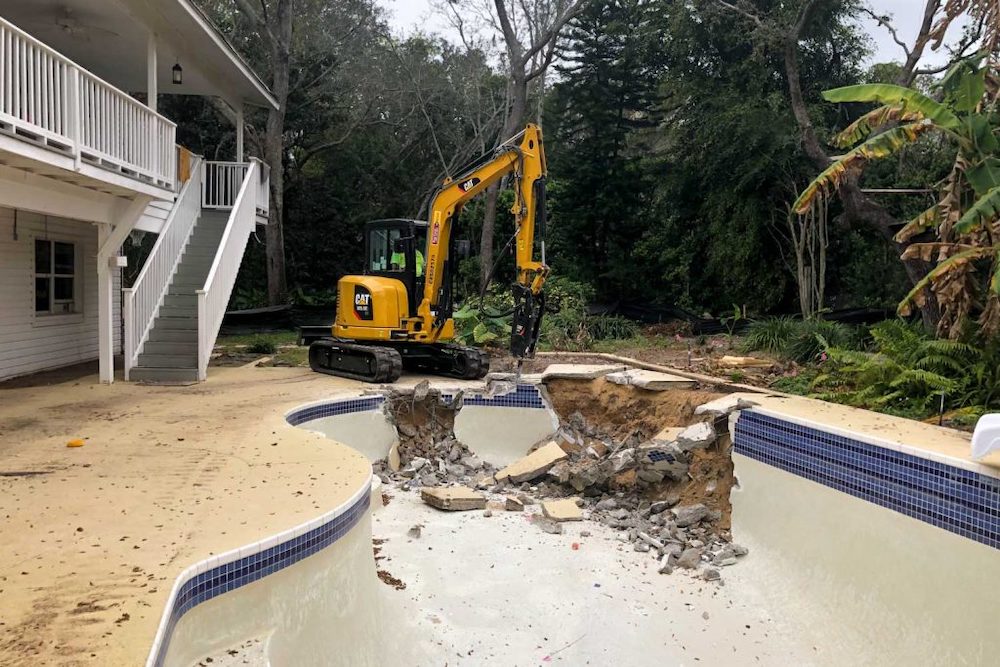
Promoting Sustainability with Demolition Contractors
Our surroundings are greatly influenced by the building sector in the ever-changing world of today. The need for sustainable practices in the infrastructure industry is growing along with the need for infrastructure. It is now essential to promote sustainability rather than merely a personal preference.
In particular, demolition contractors are vital to this movement toward environmental awareness. These professions may lessen their environmental impact and help create a more environmentally friendly future for future generations by using sustainable practices.
OUR SERVICES
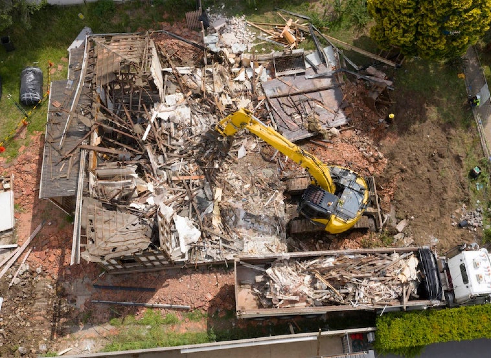
Structure Demolition. Residential, Commercial & Industrial
If your structure poses a health, safety, or environmental risk, demolition can prevent costly citations or fatal accidents. While this may seem daunting, you are just a phone call away from having your residential demolition done professionally, responsibly, and at a great price.
Talk to a Demolition Specialist Now! 916.249.5001
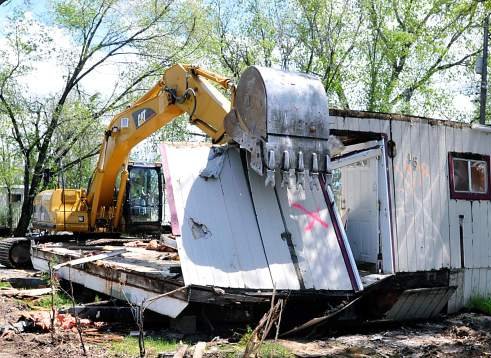
Mobile Home Demolition
We demolish and haul away mobile homes. Any size, anywhere, anyhow. We are fast, clean and competitive. We serve most of Northern California. There are many factors to consider when removing or demolishing your old trailer, mobile home, or manufactured home like: the processes involved, costs, time, contractors, debris, and permits.
Talk to a Demolition Specialist Now! 916.249.5001
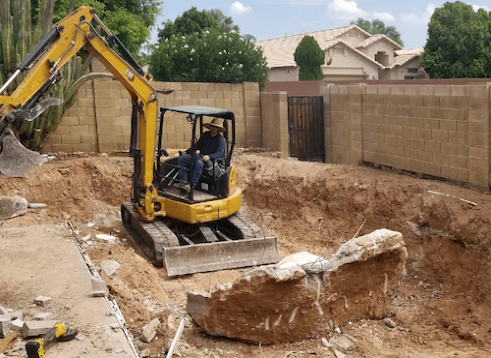
Pool Demolition
When removing a pool in Sacramento, California with the professional demolition team of Maxton Demo, you’re guaranteed peace of mind from beginning to end. From your initial request for an estimate to clean-up, you can expect our pool demolition process that’s completely professional and safe.
Talk to a Demolition Specialist Now! 916.249.5001
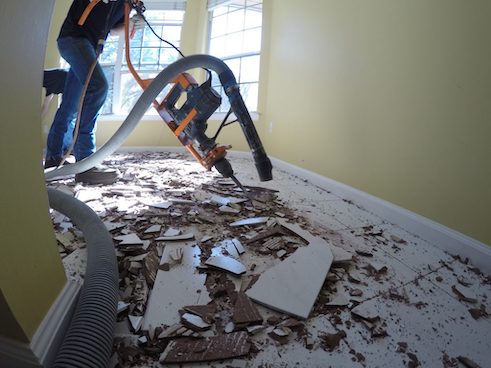
Floor Demolition
Flooring demolition, like any other major home renovation work, requires a specific set of skills and tools to be performed properly. You need experts in flooring demolition to get you the best floors possible. Contact us to find out more about how we can help you today.
Talk to a Demolition Specialist Now! 916.249.5001
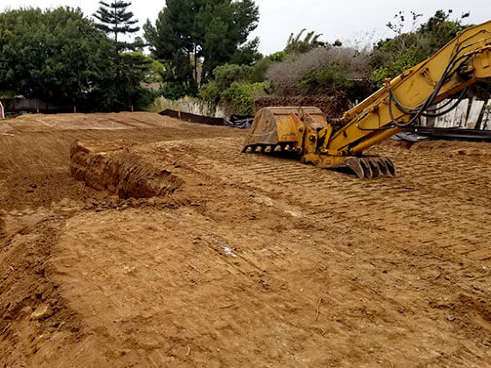
Grading & Excavating
If you need an experienced excavator and grader in Sacramento, call us today. One of the many reasons that residential, commercial, and industrial customers choose to work with us is because we’re able to provide a broad range of services to help construction-related projects get done in less time and at a reduced cost.
Talk to a Demolition Specialist Now! 916.249.5001

Roof Snow Removal
Heavy snow & ice dams can cause significant roof and home damage. Roof Snow removal is our specialty during the winter months. Serving the Sacramento, California area for 10 years, we can get your roof snow removed and promise a quick response and reasonable rates.
Talk to a Demolition Specialist Now! 916.249.5001
The Value of Encouraging Sustainability in the Building Sector
The resource-intensive nature of the building sector is well recognized, and it often leads to significant levels of waste creation and energy use. Within the industry, there is a rising focus on encouraging sustainability as environmental challenges continue to gain attention. Sustainable business methods save money and increase productivity, in addition to lowering the industry’s carbon impact. Construction businesses may show that they care about the environment by including eco-friendly practices into every phase of a project, even destruction.
Sustainability in construction refers to all aspects of a building’s lifetime, from planning and design to demolition and beyond, and extends beyond the use of environmentally friendly materials. Therefore, it is imperative that demolition contractors make sure that buildings are demolished in a manner that optimizes resource recovery and reduces waste. These contractors have the capacity to create new benchmarks for the industry and encourage others to follow suit by integrating sustainability into their operations.
What does the role of demolition contractors in sustainability entail?
The experts in charge of safely and effectively demolishing roads, bridges, and buildings are known as demolition contractors. Although demolishing old buildings is their main goal, these contractors are essential to encouraging sustainability in the building sector. Demolition contractors may lessen the negative effects of their work on the environment and lay the groundwork for a more sustainable future by using eco-friendly methods.
Reusing or recycling materials from demolished buildings is one of the main duties of demolition contractors. Through the salvage of materials such as concrete, metal, and wood, these contractors may lessen the quantity of garbage that ends up in landfills and lower the need for new raw materials. Furthermore, using cutting-edge methods and technology to guarantee that the deconstruction process is as effective and ecologically friendly as possible is another feature of sustainable demolition practices.
Ideas for Encouraging Sustainability in Projects involving Demolition
It takes initiative and a dedication to best practices to promote sustainability in demolition operations. Take into account the following advice to improve the sustainability of your demolition projects:
Plan Ahead: Create a thorough demolition plan that incorporates energy-saving, material-salvage, and waste-reduction techniques.
Make Recycling a Priority: Collaborate with recycling facilities to make sure that a maximum amount of items are recycled for future use and kept out of landfills.
Employ Efficient Equipment: Make an investment in cutting-edge demolition equipment that uses less energy and has a less environmental effect.
Educate Your Team: Provide your demolition team with training on sustainable methods and the value of resource conservation and trash minimization.
Track Performance: Determine areas for improvement to increase sustainability and evaluate the environmental effect of your demolition projects on a regular basis.
The effects of pool demolition projects on the environment
Pool demolition projects may have a negative impact on the environment, mostly in terms of trash and pollutant production. Emissions from heavy equipment, such as excavators and dump trucks, are a contributing factor in air pollution. Furthermore, disposing of concrete, fiberglass, and other pool components may put additional strain on landfills, making waste management a more pressing problem. Chemicals used in pool maintenance products may endanger nearby ecosystems and water supplies if they are not managed carefully during demolition and leach into the groundwater and soil.
The destruction of a pool has an effect on the ecosystem that goes beyond the local area around the project site. The process’s carbon footprint is increased by the movement of materials to and from the location, particularly when large distances are covered.
Furthermore, the noise pollution produced by the demolition machines may agitate nearby species and upset the ecosystem. Both contractors and homeowners must understand these consequences and have plans in place to reduce environmental damage.
The consequences of pool demolition operations emphasize how important it is to use sustainable building and remodeling methods. Through a careful examination of the environmental effects of every stage of a project, stakeholders may make well-informed choices that are consistent with environmentally conscious ideals.
Investigating alternate techniques for pool destruction becomes crucial as the need for greener alternatives grows. In order to lessen our influence on the environment, let’s now examine water-saving techniques for pool destruction as well as the appropriate disposal and recycling of pool debris.
Conserving Water While Demolitioning a Pool
Water, a priceless resource, is essential to pool demolition operations, especially when it comes to emptying the pool before work starts. This water may amount to hundreds of gallons; instead of throwing it out, think about using it for irrigation.
Redirecting pool water to gardens, lawns, or other landscape elements helps reduce the environmental effect of demolition while also conserving water. Using water-saving techniques while demolishing pools is a proactive move in the direction of sustainability.
Utilizing leftover pool water is only one aspect of efficient water management. Preventing water pollution during the demolition process is another aspect of it. If adequately controlled, chemicals used for pool maintenance, such as chlorine and algaecides, might leak into the water supply. Protecting water quality requires not just installing appropriate drainage systems but also putting in place measures to stop chemical runoff.
Pool demolition projects that prioritize water conservation show a dedication to resource efficiency and environmental sustainability.
In order to optimize water conservation during pool demolition, it may be beneficial to use environmentally sustainable demolition methods that reduce water consumption.
For example, the amount of water needed for demolition may be decreased by using methods like hydrodemolition, which breaks down concrete using high-pressure water jets. Incorporating water-saving techniques and technology into pool demolition not only preserves this valuable resource but also establishes industry standards for environmentally friendly building methods.
Appropriate Pool Material Disposal
During demolition operations, disposing of pool debris poses a serious environmental risk. In order to reduce the negative effects on the environment, concrete, rebar, fiberglass, and other pool materials must be handled and disposed of appropriately. Recycling is an environmentally friendly method of disposing of pool debris.
For instance, concrete may be broken and recycled into aggregate for use in future building projects, which lowers the need for virgin materials and keeps trash out of landfills. Through the integration of recycling processes into pool demolition operations, interested parties may lessen their environmental impact and promote a circular economy.
Appropriate waste management techniques are crucial for reducing the environmental effects of pool demolition, in addition to recycling. Recycling efforts are aided by sorting materials to separate recyclable from non-recyclable components, which expedites the disposal process.
Pool materials are disposed of responsibly when waste disposal firms that promote sustainability and use eco-friendly methods partner with you. One of the most important steps in completing pool demolition operations with sustainable results is the responsible disposal of pool components.
Additionally, investigating cutting-edge disposal techniques offers chances for original environmental solutions, such as repurposing pool components for new buildings. For example, fiberglass from pool shells may be recycled into insulation or used to make composites, which would prolong the material’s useful life and cut down on waste.
Stakeholders may lessen the environmental effect of pool demolition projects and promote a more circular and resource-efficient economy by adopting innovative techniques of waste disposal.
Options for Recycling Pool Materials
Recycling is essential for reducing the negative environmental effects of pool demolition operations since it keeps debris out of landfills and preserves precious resources. It is possible to crush and recycle concrete, which is often used in pool buildings, to use as aggregate for new concrete projects or road foundations.
Stakeholders lessen the need for virgin aggregate mining, which may deplete natural resources and disturb ecosystems, by reusing concrete from destroyed pools. A sustainable approach to building and demolition operations is fostered by including recycling alternatives in pool demolition projects.
To reduce waste and encourage resource conservation, materials used in pools, such as fiberglass and metal components, may also be recycled in addition to concrete. Fiberglass, which is often used to make pool shells, has other uses outside of swimming pools, such as art installations, composite materials, and insulation.
Fiberglass recycling keeps trash out of landfills and lowers the energy and raw materials needed to create new goods. Adopting recycling programs for pool materials shows a dedication to the circular economy and environmental responsibility.
By making it possible to recover valuable materials from pool components, innovative recycling technologies further improve the sustainability of pool demolition operations. By extracting and reusing metals, polymers, and other materials from destroyed pools, advanced recycling techniques may close the circle between material use and trash production. Stakeholders in the construction sector may shift to a more resource-efficient and sustainable paradigm where trash is seen as a valuable asset rather than a throwaway burden by using recycling alternatives and technology.
Reducing Carbon Emissions During the Demolition of a Pool
Mitigating the environmental effects of building operations requires lowering the carbon footprint of pool demolition initiatives. A demolition project’s carbon footprint includes all of the emissions produced throughout the project’s lifespan, from material delivery to equipment operation.
Stakeholders may use a variety of tactics, including energy-efficient technology, efficient equipment use, and efficient transportation policies, to reduce carbon emissions.
Pool demolition projects may be in line with sustainable principles and help mitigate the effects of climate change by intentionally lowering carbon emissions.
Energy-efficient tools and equipment are a good way to reduce the carbon impact of pool demolition. Using equipment that is electric or hybrid and powered by renewable energy sources minimizes emissions while in use and lessens dependency on fossil fuels.
Further reducing the project’s carbon intensity is scheduling demolition operations during off-peak hours, when energy consumption is lower. Pool demolition projects may have a major negative influence on the environment if stakeholders prioritize energy efficiency in the procurement and operation of equipment.
For pool demolition operations to have the least possible carbon impact, careful planning and logistics are essential. Reducing emissions related to material transport may be accomplished by enhancing vehicle capacity, streamlining material delivery, and optimizing transportation routes.
Resources are used ethically and sustainably when a logistics strategy that puts efficiency and emission reduction first is put into action. Stakeholders may improve operational efficiency and reduce the carbon footprint of pool demolition projects by optimizing transportation procedures and cutting down on pointless journeys.
Another method to lessen the negative effects of carbon emissions on the environment is to include carbon offsetting programs in pool demolition operations. One way to mitigate the emissions produced during demolition operations is to purchase carbon credits, invest in renewable energy initiatives, or support replanting programs. In addition to offsetting the project’s carbon impact, carbon offsetting supports international efforts to mitigate climate change. Stakeholders may show their dedication to sustainable resource management and the environment by adopting carbon offsetting techniques.
Advantages of Selecting Eco-Friendly Pool Demolition Businesses
There are several advantages to choosing ecologically friendly pool demolition firms for the project’s stakeholders as well as the environment. Throughout the demolition process, environmentally conscious demolition firms give priority to sustainable measures, including recycling, trash minimization, and energy efficiency.
Homeowners and builders may lessen the environmental effect of pool removal operations and promote a greener building sector by collaborating with these businesses.
Selecting ecologically friendly pool demolition firms has advantages that go beyond environmental concerns to include social and economic gains.
Pool demolition businesses that care about the environment follow strict environmental laws and certifications, guaranteeing adherence to industry norms and best practices. Stakeholders may be certain that demolition operations are carried out in an ecologically responsible way, protecting communities and ecosystems, by working with these businesses.
Furthermore, green businesses often use eco-friendly tools and methods that save waste, preserve resources, and lessen pollution, raising the bar for sustainable building methods.
Selecting ecologically friendly pool demolition firms has advantages for the environment as well as financial and operational savings for project participants. Reusing resources more efficiently and recycling materials are two examples of sustainable practices that may save project costs and consumption. Additionally, stakeholders can improve their image as socially conscious organizations dedicated to environmental care by partnering with eco-friendly businesses. The financial benefits of working with green pool demolition businesses highlight the building industry’s commercial argument for sustainability.
Stakeholders may reduce the environmental impact of demolition projects and promote a more resilient and sustainable built environment by choosing environmentally responsible pool demolition contractors. These businesses encourage good change in the construction sector by placing a high priority on resource efficiency, innovation, and environmental stewardship. Through cultivating alliances with ecologically aware businesses, stakeholders may work together to forward sustainability objectives, encourage the circular economy, and build a more sustainable future for future generations.
Government Rules and Approvals for the Demolition of Eco-Friendly Pools
Environmental standards compliance and the promotion of eco-friendly techniques in pool demolition projects are greatly aided by government rules and certifications. Construction operations are subject to regulatory frameworks established by local, state, and federal agencies that provide rules for waste management, pollution avoidance, and resource conservation.
Stakeholders may protect the environment, maintain public health, and show that they are committed to their legal and ethical obligations by following these standards. Comprehending the legislative framework pertaining to pool destruction is essential in order to manage compliance obligations and promote enduring results.
Pool demolition businesses that respect high standards of sustainability and environmental performance may be found by looking for certifications and accreditations. Organizations that excel in resource conservation and environmentally friendly practices are recognized by certifying organizations like the Leadership in Energy and Environmental Design (LEED) program.
Stakeholders may guarantee that demolition operations are carried out in compliance with set sustainability guidelines and best practices by selecting certified pool demolition providers. A dedication to operational excellence and environmental responsibility is signaled by a certification, which is a symbol of quality and trust.
Eco-friendly approaches to pool demolition projects are further encouraged by government support programs and incentives, which provide stakeholders with financial help, tax breaks, and regulatory advice. The construction sector is encouraged to embrace sustainable practices and technology by means of initiatives such as green building subsidies, renewable energy rebates, and sustainable construction tax credits.
Stakeholders may reduce expenses, improve project viability, and quicken the shift to ecologically friendly practices by using government incentives and support programs. In order to achieve sustainability objectives, stimulate innovation, and cultivate an environmentally conscious culture within the construction industry, government assistance is essential.
Adopting rules, certifications, and incentives from the government while working on pool demolition projects guarantees adherence to environmental laws and fosters an accountable and sustainable culture in the building sector.
Stakeholders may improve project results, lessen environmental impact, and contribute to a more resilient and sustainable built environment by adhering to regulatory standards and industry best practices. The cornerstones of sustainability are government certifications and regulations, which direct stakeholders toward ethical decision-making and provide standards for environmentally friendly building techniques.
The significance of taking the environment into account while planning pool demolition projects
The effects that pool demolition operations have on the environment highlight how crucial it is for building projects to use eco-friendly substitutes and sustainable techniques. If pool demolition is not handled properly, it may have a significant negative impact on the environment, resulting in waste production, pollution, resource depletion, and ecological disturbance.
Stakeholders may reduce environmental impact and advance sustainable results by giving water conservation, appropriate material disposal, recycling possibilities, and carbon footprint reduction top priority in pool demolition projects.
Investigating environmentally appropriate substitutes for conventional pool demolition techniques, such as deconstruction and reuse, provides creative answers that lessen waste production, save resources, and promote the circular economy. The environmental performance of demolition projects may be further improved by selecting environmentally sensitive pool demolition firms that promote sustainability and follow legal requirements.
A greener and more resilient construction business may be achieved by stakeholders navigating compliance requirements, driving positive change, and aligning with government rules, certifications, and incentives.
It is crucial that homeowners, contractors, and legislators take into account the environmental effects of pool demolition operations and adopt eco-friendly procedures as we move toward a more sustainable future. Stakeholders may design a built environment that is resilient and ecologically responsible, in addition to being practical and aesthetically beautiful. This can be achieved by including environmental factors in decision-making processes.
In order to achieve sustainable building practices and create a more sustainable and environmentally friendly future for everybody, it is first necessary to dedicate oneself to environmental stewardship, creativity, and teamwork. Let’s work to eliminate swimming pools in a way that is sustainable and mindful of both our communities and the wider environment. We can create a brighter future for future generations if we work together.
Do you have a Question?
Talk to a Demolition Specialist Now! 916.249.5001
Request Formal Quote